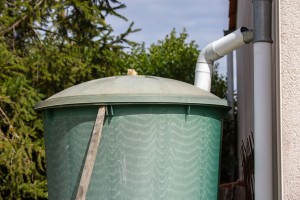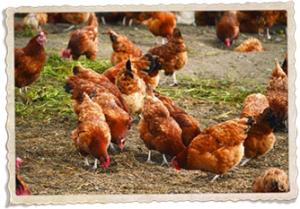Perhaps one of the most burdensome chores as an owner of backyard chickens is carrying water to the coop. After all, lugging water around is never easy, and the coops are often a good distance away from any water source.
A great solution to this problem, though, is a rain barrel system. This is where you collect clean, fresh rainwater for your chickens. 
Using rain barrels is not only efficient, but it can also be economical. A half-inch of rain that falls onto 250 square feet can produce up to 78 gallons of water. Best of all, this water is completely clean and won’t harm your chickens one bit. While rain barrels shouldn’t be your only source of water, and they should always be heavily monitored, they can be extremely helpful nonetheless.
Here’s how to get started:
Find the right rain barrels
While you could certainly make your own, it’s easier just to buy a rain barrel from Amazon, Lowe’s, or another home goods store. There are plenty of rain barrels out on the market, so find the one that will fit your space and your needs the best. Consider how much water you actually need, and how much money you can afford to spend. We also recommend that you find one with a top covering, as open stagnant water can be a jackpot for mosquito larvae. This, in turn, could cause fowl pox to run rampant through your flock.
Get them positioned
Now that you have your rain barrels, you need to place them in the right spot. Since the purpose of doing this is to save you some legwork, you’ll obviously want them right by the coop. So, place your rain barrels outside the coop, right where most of the water runs off of the roof.
Keep them secured
Finally, as you’re setting up your rain barrel system, place a few cinder blocks underneath each barrel so that they sit up off the ground. This makes it easier to draw water out of the tap at the base of the barrel, saving you time and effort in the long run.
For more tips on how to care for your backyard chickens, read over our blog or contact Chickens for Backyards today!

